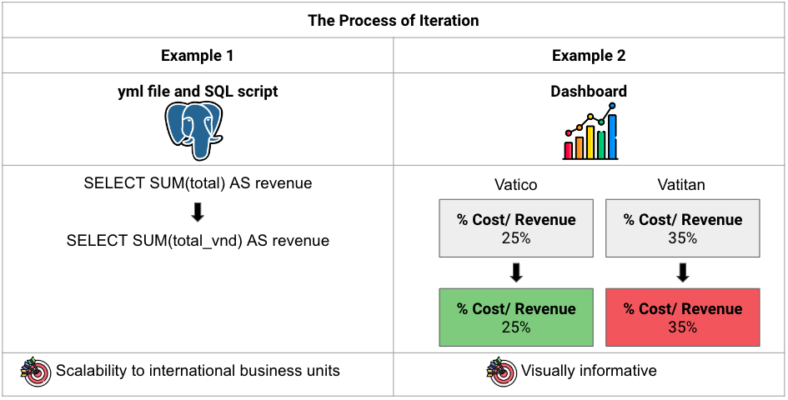Blog - Hướng dẫn, Training Data
How do the first two weeks look like for data analysts at Vatico?
In the previous blog post, I wrote about the role of a data analyst at Vatico. Today, I will share how my first two weeks at Vatico had been. Undeniably, I was overwhelmed with the sheer amount of tasks and was getting used to how fast-paced this start-up is. I will thus share two key takeaways in my first two weeks so that future Vatico data analysts can adjust more quickly. The takeaways are the importance of planning and the process of iteration.
If you fail to plan, you plan to fail
Shortly after joining Vatico, I was told that I should plan properly if I want to solve a problem effectively. That is through scoping a problem and designing a wireframe. Initially, I did not fully appreciate the importance of scoping the task. I learnt the hard way, having to redo a particular task because I did not plan properly.
While it is tempting to skip planning for a task, I learnt from experience the importance of scoping a task, grounded in its objective, action items, and definitions, as seen in the table below.

I grasped the importance of knowing the objective of the task inside out: what is the gap we are filling; what is the significance of the task; for whom is this for. Initially, I found myself having to ask the Data Lead many questions, when most questions can be answered by revisiting the objective of the task. For example, I used to ask the Data Lead whether a particular Postgres reporting table needs to be loaded onto the dashboard but I subsequently understood that ad-hoc data analytics needs such as the quantity and revenue by payment method do not have to be loaded to the dashboard because they are not relevant for the monthly report. It is therefore crucial to be crystal clear about the objective.
In the initial phases of the internship, I used to feel very overwhelmed by complex tasks but I learnt from the Data Lead how to break down a seemingly insurmountable challenge into smaller and more solvable steps. Writing down the action items needed to conquer a convoluted task helped keep me on track and gradually progress towards solving difficult tasks. Please refer to A Problem-Solving Framework to find out more about this.
Apart from these, I also learnt how crucial it is to define key terms. As a full-fledged data analyst, I am not involved in other departments such as operations and marketing, hence there were times when I made assumptions about certain definitions, for instance what is cost per sale. I now make it a point to define the metrics which I will perform data analytics on.
The process of iteration
In the first two weeks of my internship, I had precious takeaways about the importance of planning. In addition, I also appreciated the beauty of iteration. When creating the monthly key performance indicators report dashboard, I had to redo many of my tasks, for instance editing the yml file and SQL scripts repeatedly, and refining the dashboard till it is visually informative.
Referencing Example 1 in the table below, I initially selected the sum of the total price for all products to derive the revenue. However, I soon realized that Vatico has other business units in Singapore, which means I need to convert the total price to a common currency: vietnamese dong and subsequently select the total price in vnd. The impact of this is that it ensures that the code is scalable to other business units.
Another example (Example 2) is that I initially had the same color scheme for all % Cost/ Revenue. After getting feedback that it is not visually informative, I changed it to green when %Cost/ Revenue is 30% and below, and red when %Cost/ Revenue is greater than 30%. The new colour scheme conveys more about how healthy Vatico’s %Cost/ Revenue is to the management than the previous design.

Though a key target of any data analyst is to complete tasks, I learnt that the end product is rarely final because change takes place across time and space, creating new objectives which businesses need to adapt to. It is therefore important to be grounded in business objectives, and embrace the process of iteration.



